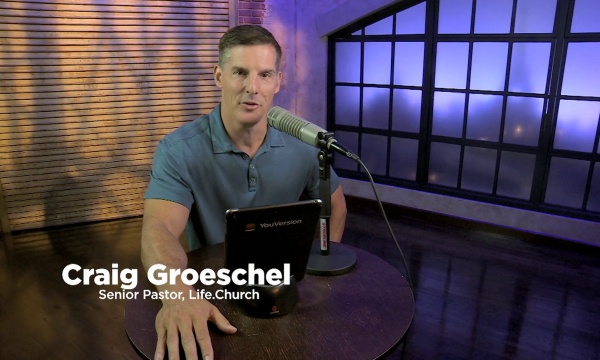Thank you for joining the Craig Groeschel Leadership Podcast! If you’re a leader, you probably also want to improve as a speaker. Most of us see video of ourselves and get depressed because we’re not as good as we think we are. Today, we’ll discuss a few ways we can sharpen our communication skills and make ideas stick in the minds of the people who need to know them.
“The single biggest problem in communication is the illusion that it has taken place.” – George Bernard Shaw
People aren’t thinking about you. People are thinking about themselves. It’s not a bad thing, it’s just true. When people roll into your planning meeting, they’re wondering if they are in trouble for running late, they’re mad because they’re husband didn’t say goodbye, or thinking about who gets the kid to soccer practice. When they come to church, they aren’t always thinking about what they’ll learn. They’re excited about seeing friends, getting donuts, hoping they’ll see the cute girl greeting, or they’re scared because it’s their first time. They are consumed with themselves, not with you.
Before you communicate anything, answer these three questions:
- What do I want people to know?
- What do I want them to feel? (Emotions moves people to action.)
- What do you want them to do? (If they can’t define it, they can’t do it.)
Here’s a big thought: You are never just talking. You are always leading!
Apply that to your role:
- You are never announcing—you are leading.
- You aren’t just running a staff meeting—you are leading to the specific purpose.
- You aren’t having a developmental conversation—you are leading to a desired outcome.
Remember, you don’t have to know it all to be a great leader! Be yourself. People would rather follow a leader who is always real than one who is always right.
DISCUSSION QUESTIONS
Here's an exercise you can do to grow as a leader. Ask your team these questions:
- What is the number one thing you need to communicate to your team during this season?
- How can you become more “you-centered” in your communication?
- What do you want your audience or team to know, feel, and do?
LISTENER QUESTIONS
A leadership style I enjoy but have candidly struggled with is servant leadership. I think many folks confuse it for appearing to be somewhat like passive leadership but I believe it aligns much more closely with empowering leadership. It seems to be a delicate walk. What are your thoughts? – Lance
I agree! In the past, leadership was more authoritarian and top-down. You’d exercise power over others. A servant leader has a different mindset. The servant leader cares about the needs of others. Rather than protecting the power, our goal as a servant leader is to empower others. Some may disagree, but I see a progression in leadership like this:
At the lowest level…
- Your team will hate you.
- Your team will fear you.
- Your team will like you.
- Your team will love you.
- Your team will trust and respect you.
To be trusted and respected, you must share what you have and care about others. As a servant leader, lead boldly but always from the heart.
I’ve talked more about passive and empowering leaders in two previous episodes called Six Types of Leaders. Check out the Leadership Training section here to view.
How do you get your volunteers to think less like volunteers and more like owners? I want my volunteer leaders to take ownership of their positions and their teams of volunteers. – Holly
This question doesn’t just apply to volunteers, but team members too. What you care about determines what you can be trusted with. The best leaders think like owners, not like employees! Someone who thinks like an employee might close the shop 10 minutes early and turn away a customer, but someone with an owner’s mindset would keep the store open to welcome the customer and maybe even make a sale.
In his book Turn the Ship Around!, the author tells about how he trained those on his ship to say “I intend to.” What that does is encourage active thinking. It turns passive followers into active leaders. We want to lead volunteers and team members to anticipate the questions you, the leader, will ask when they arrive in the morning. In this way, they are taking ownership. Volunteers will never think like owners unless we give them ownership.
Have a question for Craig? Email him at leadership@life.church.
EPISODE RESOURCES
- Leave a review: www.go2.lc/leadershippodcastitunes
- Catalyst One Day: www.catalystconference.com/oneday
- Watch Life.Church messages: www.life.church/watch
- More from Craig: www.craiggroeschelbooks.com
- Free church resources & tools: www.life.church/churches
- Sign up to receive show notes: www.life.church/leadershippodcast
- L. David Marquet, Turn the Ship Around!: A True Story of Turning Followers into Leaders
- Six Types of Leaders, Part 1: Watch, Listen, and Download Show Notes
- Six Types of Leaders, Part 2: Watch, Listen, and Download Show Notes
CONNECT WITH CRAIG
- Ask questions: leadership@life.church
- Facebook: www.facebook.com/craiggroeschel
- Twitter: @craiggroeschel
- Instagram: @craiggroeschel
- Snapchat: @craiggroeschel
- Periscope: @craiggroeschel



